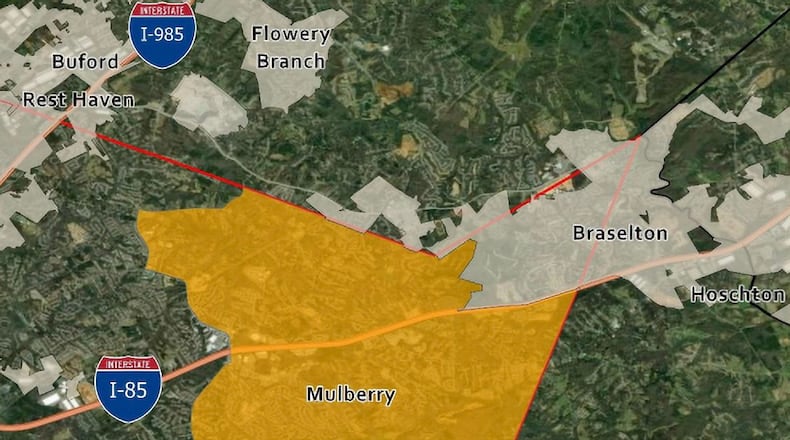A Gwinnett County Superior Court judge Thursday rejected an emergency motion to strike the proposed city of Mulberry from the ballot in next week’s election
Stephen Hughes, who lives within the boundaries of the proposed city in northeastern Gwinnett, last month sued each member of the Gwinnett elections board and Elections Supervisor Zach Manifold, arguing the legislation that sent the question to the ballot was unconstitutional. He filed an emergency motion last week and asked for a writ of mandamus striking the ballot question.
Judge Tadia Whitner on Thursday said ruling on the proposed charter’s constitutionality would be premature because voters have not ratified it. If voters reject the city, the lawsuit will be dismissed, but if the city passes, the case can go on, she said.
Early voting is underway.
“If the referendum is approved, then we will be back in court,” Hughes told The Atlanta Journal-Constitution.
The proposed charter states the new city will provide planning and zoning, code enforcement and storm water management and will not change its services or impose a property tax unless voters approve it in a referendum.
Hughes’ lawyer, Allen Lightcap, argued that the legislation that sent the proposed Mulberry charter to voters was a local bill, but the Legislature can’t dictate municipal taxation or services through local laws that only apply to certain cities or counties.
Bryan Tyson, the attorney for the pro-cityhood committee Citizens for Mulberry, said the charter can be amended.
“Then the voters would be left with a city they didn’t vote for,” Lightcap said.
The state attorney general’s office, which is served in all lawsuits where constitutionality is in question, argued the lawsuit must only name one government as a defendant and needs to be dismissed and potentially re-filed.
If incorporated, the new city would have about 41,000 residents. It would be Gwinnett’s largest city by land area and its second largest by population.
State House Majority Leader Chuck Efstration, a Republican who would live in the new city, and state Sen. Clint Dixon, R-Buford, proposed the city earlier this year as a way to give residents more control over the area’s growth after a developer pitched a 700-unit apartment complex in the area.
Efstration and Dixon criticized Hughes for filing a lawsuit to stop an election.
“This last-minute measure trying to stop it, it’s just un-American in my opinion,” Dixon told the AJC.
About 20 opponents of the proposed city sat in the audience wearing red shirts and name tags reading “Vote No.” A handful of Mulberry supporters wore green.
About the Author
Keep Reading
The Latest
Featured




